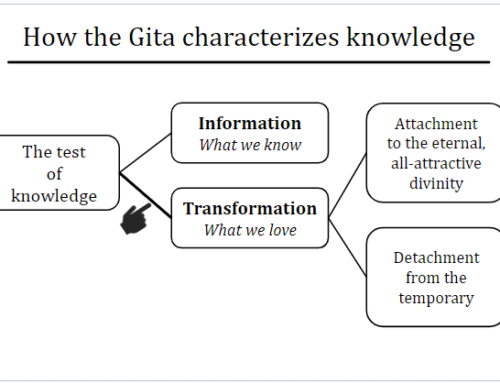Some people fear, “If I become too spiritual, I won’t be able to relate with most people for they are materially-minded. Won’t I end up feeling lonely?”
This fear betrays a common but serious confusion between lonely and solitary. Both refer to a state of social isolation.But the key difference between them is the direction of our consciousness, our desires, our heart. When these are externally directed, social isolation makes us feel lonely, bored, deprived. When these are internally directed, social isolation engenders solitude, introspection, rejuvenation. Loneliness is like night, a state of disconcerting darkness.In contrast, solitude is like day, a state of comforting illumination.
Pertinently, the Bhagavad-gita (13.11) mentions solitude as characteristic of those who cultivate spiritual knowledge. Such knowledge-seekers aspire to live in a solitary place (vivikta desha-sevitvam) and are detached from the general mass of people (aratir jana-samsadi). They see social isolation not as a threat but as an opportunity. It provides them the necessary physical and emotional distance from the world’s obsession with materialism. Thus distanced, they can better contemplate and comprehend the unchanging spiritual realities that underlie the ever-changing material appearances.
Significantly, bhakti-yoga offers us an easier way to re-direct ourselves from matter to spirit: associate with those who are spiritually-minded. In the association of advanced devotees, spiritual knowledge doesn’t remain a matter for abstract analysis.It becomes the setting for relishing living, loving experiences.
Nonetheless, even on the devotional pathsolitude is a potent resource for us. We may under-utilize devotee-association by seeking it merely for its social pleasantries and emotional comforts – not for its spiritual potency. Brief, regular periods of solitary introspection help us evaluate whether we are redirecting our heart from the world to Krishna.
When we thus tap both association and solitude, loneliness flees far away.
Bhagavad Gita Chapter 13 Text 11
“Humility; pridelessness; nonviolence; tolerance; simplicity; approaching a bona fide spiritual master; cleanliness; steadiness; self-control; renunciation of the objects of sense gratification; absence of false ego; the perception of the evil of birth, death, old age and disease; detachment; freedom from entanglement with children, wife, home and the rest; even-mindedness amid pleasant and unpleasant events; constant and unalloyed devotion to Me; aspiring to live in a solitary place; detachment from the general mass of people; accepting the importance of self-realization; and philosophical search for the Absolute Truth – all these I declare to be knowledge, and besides this whatever there may be is ignorance.”


Leave A Comment